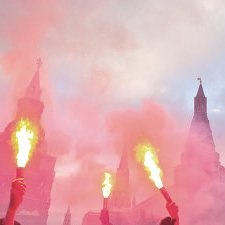(Guest post by Evert van der Zweerde) A series of recent diplomatic scandals in Russian-Dutch relations raise questions about the nature of the deteriorating relationship between the two countries. Are there purely political issues or something more substantial? What do Dutch experts (and the Dutch mass media) think about all this?
The recent events that led to the current frosty situation are: a Russian diplomat was detained in the Netherlands, a Dutch diplomat was beaten in Mosow, and then the Russian trade mision was robbed in the Hague. A few months earlier, Vladimir Putin's visit to the Netherlands was marred by LGBT protestors.
Not wanting to get lost in the details, I will provide a few "mainstream reactions" among the Dutch population and in the media, and then give a brief comment of my own.
Many people in the Netherlands find the Russian reaction to the arrest of a Russian diplomat as a case of overreaction. They do, of course, recognize the concept of diplomatic immunity (but maybe fail to understand its implications), and they regret what happened, but they also think that a country should make sure that its representatives do not misbehave. On this, most Dutch people believe the story, which has been confirmed by bystanders, that the diplomat was drunk, began beating up his children, and that his wife, also drunk, damaged three or four cars. Granted, there is an official investigation that has yet to be finished. One must remember that children's rights are very well protected in the Netherlands. Locals also frown heavily on politicians or diplomats being soused in public. There have been those, however, including academics and experts, who say that the police in the Hague were wrong to enter the diplomat's house.
Either way, many people point to the real hot potato here: the controversy about gay & lesbian rights and the Winter Olympics in Sochi. The discussion about a Dutch boycott is picking up steam. The Netherlands has a strong and troublesome history on this, particularly notorious was the country’s failed attempt to boycott the 1978 World Championship in Argentina because of the military dictatorship there.
Another hot-button issue is the jailing of Greenpeace activists in Murmansk. The view from here is that even if it might be justified to prevent Greenpeace's actions in the Arctic sea, placing activists in jail long-term is never justified if they do not physically harm people.
But returning to gay & lesbian rights, most people think that Russia is treating LGBT (and other identities) pretty much the same way as people did in the Netherlands 50 years ago. The conclusion in public perception? Russia is "backward" in this respect.
What we have is a genuine mutual misunderstanding between the two socio-political-cultural systems.
The Russian side simply cannot accept or believe that the Hague police force, which arrested the Russian diplomat, functions independently of the government. That independence may lead to mistakes, but one thing is sure: the government did not know anything about it and were surely very unpleasantly surprised by the development.
Also, I think many Russian leaders find it hard to believe that an organization like Greenpeace is not connected to the government. As we know, it operates as part of the West’s civil society, and functions independently from any government. The Netherlands is full of organizations, including political parties, that the government or the prime minister Rutte do not particularly like, but that are fully legal under the Dutch constitution.
The Dutch rule of law really has a higher position than any incumbent government: not so long ago, the state of the Netherlands lost an important case in the highest court when the judge forced the government to pay compensation to the relatives of Bosnian Muslims who had died during the well-known disastrous peace operation in that country. The government tried to be relieved of the obligation to pay, but lost the case. At such moments, obviously, many people make fun of the government, but at the same time they agree with the principles of justice that are applied in such cases.
The Dutch do not understand what centralized state power means. The Dutch can be told that the so-called vertical of power is an important element of Russian politics, but their experience with this ended with the 1581 Acte van Verlatinghe, after that only the occupations by the French and by Germany (World War II) came close to centralized state power. And the Russian attitude of "we do it our way, others do it their way, and if there is a conflict, we have to negotiate" is perceived as rigid and is not understood as part of a long-standing tradition.
Finally, the Dutch do not understand what it means to be a big country. We are 16.8 million people, a little more than Moscow without its suburbs. For many Dutch, the European Union is already too big, which is part of the explanation of resistance.
Unfortuntely, the two countries are too different to really understand each other. Yet, despite the fact that the issues just mentioned are pretty serious ones, Russia and the Netherlands are so closely tied economically that no side will risk ending the relationship. Good relations between the two countries has a very long history and I do not see any strong reason why that history should break off now.
Moreover, the current Dutch minister of foreign affairs is a very able person who knows Russia very well and actually speaks Russian. And then there is the the Dutch king, Willem-Alexander, who has a small percentage of Russian royal blood running through his veins. He inherited it from Anna Pavlovna, who was Queen of the Netherlands as the wife of Willem II. Pavlovna was the daughter of Tsar Pavel and the sister of Aleksander I. The king’s planned official visit to Russia is still on for this November.
Evert van der Zweerde is a Professor of Political Philosophy at Radboud University Nijmegen, Netherlands. This comment was invited by PONARS Eurasia member Andrey Makarychev.











